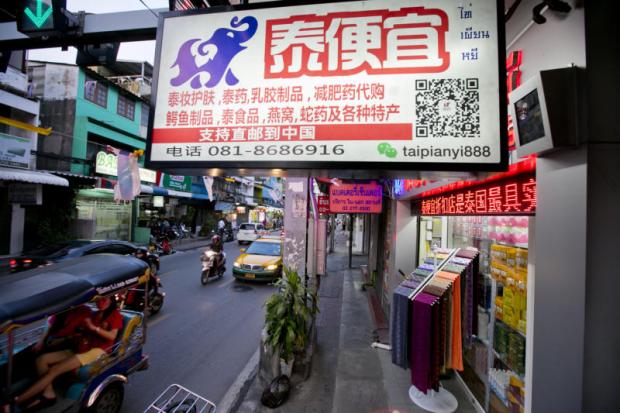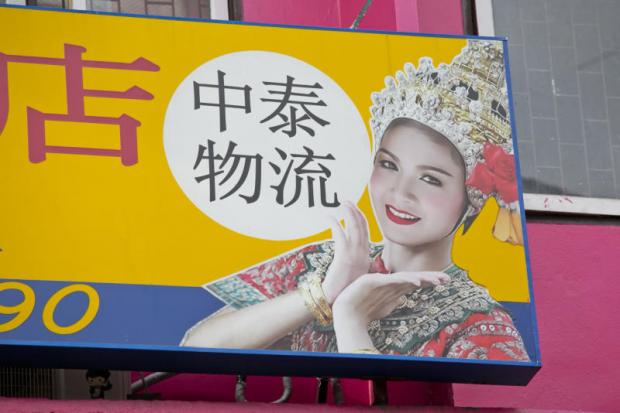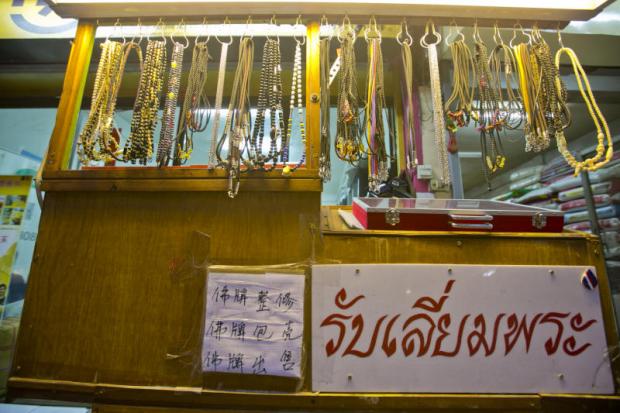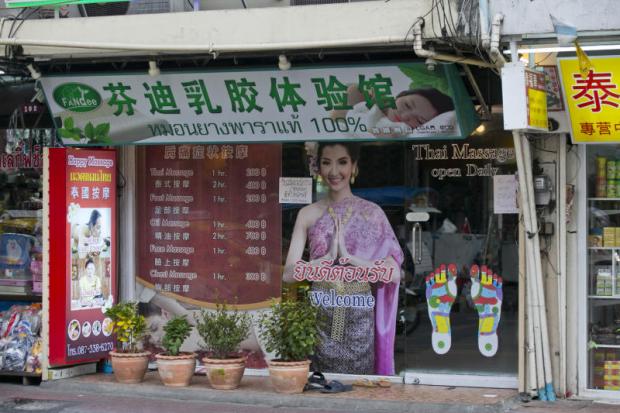
'Do you have a passport?" the patrol police bluntly ask a young Chinese man in his early twenties.
It's evening, and the confrontation is happening in a small shop on Pracha Rat Bamphen Road in Bangkok's Huai Khwang district -- an area that has been nicknamed the city's "New China Town". Beauty products, dry goods and latex mattresses occupy most of the shop space.
The young Chinese man is dressed casually in a bright green T-shirt and shorts and had entered the shop minutes before the police officers' arrival.
"I have [a passport]," he answers in broken Thai, smiling.
"Then you show me," one of the police officers asks.
"It's at my dorm."
"What are you doing here?"
"Buying things."
"What's your job?"
"I don't work."
"You don't work? How do you earn a living? Are you rich, huh?"
The conversation ends in silence and the police turn to a young woman behind the cashier's counter. She keeps her mouth shut. The shop is closed early for the night.
On the opposite side of the road, lights shine from a busy Chinese restaurant with no sign of trouble. A young waitress serves dumplings and soup to customers.
Behind her are glass shelves stacked with Thai and Chinese food products such as durian chips and the popular chilli sauce Lao Gan Ma.
Photographs hang on the wall of a man who appears to be the restaurant owner taken with Thai police, suggesting the business is above board.
The waitress speaks Mandarin and tells Spectrum she is from Guangxi. As the restaurant becomes less busy, a young cook in his twenties emerges from a kitchen to take a break and check his smartphone.
New China Town has become a favourite point of gossip among Bangkok people with its proliferation of Chinese nationals, and restaurants and businesses with signage in Chinese. But a stroll around Huai Khwang at night only tells part of the story of the new wave of Chinese migrants to Thailand and how they differ from their predecessors.
Some critics say they are taking business opportunities away from Thais and living in isolated clusters, while others argue the new wave of Chinese migrants is bringing both business initiative and opportunity.
But academics and the new wave of Chinese migrants agree Thai policymakers will have to change their mindsets to deal with the challenges the influx is bringing.
THE FOURTH WAVE
New Chinese migrants, or Xin Yimin, emigrated after then leader Deng Xiaoping launched the country's economic reforms in 1978 which led to rapid growth and a more-market based economy.
After the third wave from the 1920s to 1940s, Chinese migration was stopped by the Communist Revolution and the country closing its doors. But that did not stop many Chinese from fleeing the mainland for a better life in Hong Kong, Singapore, Malaysia, Thailand and other countries in the region.
Sakkarin Niyomsilpa, a researcher at Mahidol University's Institute for Population and Social Research, wrote in his study "The Fourth Wave: Southeast Asia and New Chinese Migrants" that they left China seeking "economic opportunity" rather than "economic survival" as previous generations had.
Deng also tried to revive foreign relations under the "good neighbour policy" implemented in Southeast Asia to bring closer political, economic and social ties. As a result, the populations of new Chinese migrants in the region increased significantly after the 1990s as China opened up more and the economy started booming.
It's estimated that Southeast Asia now has over two million "new" Chinese migrants.
But their characteristics are different from previous generations, the study says. Their place of origin is more diverse, they have higher education levels and women make up a greater percentage of the migrant population.
They mobilise for various reasons such as job opportunities, study and investment. While they might spend a period in the region, their ultimate destinations are fully developed countries such as Australia, the US, the UK and European nations.
Many Thai-Chinese living in Thailand are descendants of the third wave of Chinese migrants that have assimilated with Thais, such as the Chearavanont family which founded the Charoen Pokphand company. Their "legend" is of a Chinese voyage of hardship starting with little more than a "sheet and pillow case" and ending in wealth.
But while the study found previous generations assimilated into their new countries, the new wave of Chinese migrants are more attached to their homeland and feel less patriotic to their adopted country.
A separate survey by the Institute of Asian Studies' Asian Research Centre for Migration at Chulalongkorn University found many new Chinese migrants bring significant funds to invest in start-ups in Bangkok.
The survey of 119 Chinese migrants living in Huai Khwang for over a year found that 68.9% had a bachelor's degree. For 97.5% it was the first time they had migrated outside China.
About 74.8% came for employment such as white collar jobs, Chinese-language teachers and tour guides, while 21% came for study and 4.2% to accompany their family.
However, they intend to return to China once they have derived "enough economic benefit", researchers Supang Chantavanich and Chada Triamvithaya found.
As a result, many new China towns are forming across Bangkok, including Huai Khwang where the Chinese Embassy is located.
Features of these communities are increasing numbers of Yunnan cuisine restaurants, southern Chinese style confectionery, Chinese beauty salons and retail shops. Many apartments are increasingly occupied by Chinese.
Ms Chada said while it was difficult to determine how much money the latest wave of Chinese migrants had bought in, they had quantified the growth of Chinese business in Huai Khwang.
In shipping and logistics, there were 30 Chinese operators, while there were 14 restaurants and 18-20 beauty product shops. Ms Chada said when they inquired as to the owner of the businesses, some replied that it was a joint Chinese-Thai venture. However, the researchers interviewed local officials who suspected that some of the businesses were 100% Chinese owned and operated.
GO SOUTH, YOUNG MAN
Over the past 30 years, China has been one of the world's fastest growing economes with average annual growth of 10%.
But younger Chinese have found they can't reap the benefits and head overseas.
Aaron Li, 28, is one of those.
His father is a wealthy businessman in southwestern Yunnan province which borders Myanmar, Laos and Vietnam. Mr Li was sent to study in Bangkok 10 years ago against his will. Earning very low scores in China's national examination shut him out from access to Chinese universities and the opportunity to study business.
But at Bangkok's Assumption University, he has become a good student. He learned three languages -- Thai, Japanese and English -- and expanded his business connections.
He's managed to set up a company with a Thai partner to export rubber, silk and other commodities back to China. He's also invested in condominium units, which he says he wouldn't have been able to afford back home.
Mr Li says Thailand has given him an opportunity to be outstanding.
"If I hadn't left, I wouldn't have had all of these opportunities," he said.
"I won't go back to China. I don't like the system of doing business there. But I won't live in Thailand for the rest of my life. If I find opportunity somewhere else, I will move on."
According to Mr Li, there is too much red tape doing business in China, which involves getting state permission.
China's "socialist market economy", based on the dominance of state-owned enterprises and an open market, has convinced him he cannot maximise his profits working within these restrictions.
Launching businesses in Thailand is easier because of the "looser system" and the openness to foreign investors.
China's economic reforms have left a large gap between those doing well and those struggling at the bottom. Its National Bureau of Statistics reports that the unemployment rate has hovered around 4% for the last five years. But a new report by Fathom Consulting, an independent research organisation, indicates that the jobless rate has tripled to 12.9% from 2012.
Mr Li also believes China's restriction on freedom of speech is another factor driving young Chinese outside the country.
Deng's "Going Out" policy which encouraged enterprises to invest overseas also influenced the mindset of the younger generation to look for investment opportunities abroad.
While unfavourable factors in China may be pushing them out, they see greater opportunities in Thailand, not least the lower level of business competitiveness.
They chose Thailand because of the affordable cost of living, friendly people and low competition, according to the Asian Research Centre for Migration study.
SCHOOLED IN THAILAND
Ms Chada classifies the fourth wave of Chinese migrants in three sub groups: those born in the 1970s, the '80s and the '90s.
The oldest group experienced the transition from the communist era to a market economy and have some experience of poverty, fleeing from financial difficulties. Some of them resettled in Thailand and worked as academics and Chinese-language teachers.
The latest generation was born into an era of capitalism. They are familiar with digital technology and are highly individualistic, meaning it is more difficult for them to blend in than it was for previous generations.
Mr Chada said the younger new migrants are likely to increase in Thailand in the next five years. Many are here to gain an education then look for greener pastures.
"There will be more young Chinese migrants pouring in, including those who were born in the 2000s. Their characteristics will be much different from early migrants of the fourth wave. We better prepare for changes in [migrant demographics]."
Shanghai-born Dhu Xiu, 22, a fourth-year communications student majoring in advertising, is one of the younger generation hoping to transit through Thailand to a better life in another country.
She plans to apply for a scholarship to study for a master's degree in Australia, and perhaps get a job there. "I was not a top student in China," she said. "Scholarships there are only for the really top students. Here it is much easier and it's cheap."
Office of the Higher Education Commission statistics show the number of Chinese students in Thai tertiary institutions has grown from 4,618 in 2011 to 6,157 in 2015.
Over the same period, the number of Thai students has dropped as a result of the low birth rate. Thai private universities have also begun to sign agreements with Chinese institutions to bring in students.
Rajabhat universities, which are easier to gain admission to than public universities, are among the targets for Chinese students.
Ms Chada said despite the growing popularity of Thai tertiary institutions with Chinese students they appeared to be catering for Chinese students who had low university entrance scores back home.
"To adapt to the influx of foreign students, Thai universities should improve teaching and academic services that can create quality graduates," he said. "They should be an education option of choice."
NI HAO MA?
The number of new Chinese migrants is unclear.
The Department of Employment reported that 18,812 Chinese obtained work permits last year, almost double the figure of 9,618 Chinese in 2011.
The Immigration Department puts the total number of Chinese nationals residing in Thailand last year at 91,272, however, academic studies have put the figure as high as 350,000-400,000 in the past decade.
The larger role Chinese are playing in the Thai economy has led to a growing phobia among locals about their increased presence and influence.
Local media recently focused on a Chinese banana farm in Chiang Rai operated under a Thai nominee, which raised questions of exploitation and the undermining of Thai sovereignty.
The farm allegedly pumped a large amount of river water for its banana crops and used heavy chemicals. The bananas were exported to China via Laos.
Although there have been grumbles about their manners, Chinese visitors are also playing a major role in keeping the tourism sector buoyant. More than 7.9 million Chinese tourists visited last year, up 71% on 2014 despite the slowing Chinese economy.
Tour operators have been forced to respond by hiring translators and providing signage and menus in Chinese.
But the influx has also resulted in complaints about "zero-dollar tours" where cheap travel packages are pre-sold to Chinese who spend as little as possible while in Thailand. Here too, there are complaints the tour companies are being run via Thai nominees, with customers paying through electronic channels to avoid tax.
China too is threatening to replace Japan long-term as the biggest foreign investor in Thailand. As Beijing and Bangkok have been drawn closer diplomatically and militarily over the past two years, the junta has struggled to revive exports and domestic demand after 10 years of political unrest.
In the first quarter of this year, investment pledges from China jumped fivefold to 5.7 billion baht compared to 1.1 billion baht a year earlier, making China the third-largest investor as firms raced to meet a tax break deadline.
However, the figure was still way behind Japan which pledged 15.6 billion baht.
Last year China was the fourth-biggest foreign investor in Thailand, behind Japan, the US and Singapore. Chinese companies have emerged as potential investors for major development projects in special economic zones and high-speed rail projects.
As the expatriate Chinese community grows, real estate investment is also on the rise as they look for second homes in Thailand.
Bundit Sirithunyhong, who runs the Suttangrak Group, is developing housing projects worth five billion baht to sell as time-shares to Chinese buyers.
"I think they are not just investing in real estate, but starting to use Thailand as a base for business in Southeast Asia," he said earlier this year. "Here they can stay and work as their second homes."
Yos Santasombat from Chiang Mai University's department of sociology and anthropology said Thai policymakers had to readjust their thinking.
"No one can stop the influx of new Chinese migrants," he said at the Thailand Research Expo last month. "We will have to create an atmosphere that makes Chinese migrants feel like they are a part of, but not assimilated into the countries where they reside."
He criticised the Thai government for not seeing the opportunity to build such an atmosphere, rather than coming under the influence of China which is hungry for resources to meet their economic demands.
He said the Chinese government may view migration as a "civilising mission" to help other countries develop a more positive view of China.
"Is China a danger to us? I won't draw that conclusion. But what I will say is we must learn from them," Mr Yos said.
"It's important for Thailand to better understand the process, outcome and impact of the flow of migrants so we can adapt skilfully and peacefully to the influx."

SPEAKING THE SAME LANGUAGE: Chinese characters are found increasingly in Huai Khwang in order to cater to the the new wave of migrants who are seeking temporary settlement in Thailand.

WRITTEN IN THE SCRIPT: Fourth wave migrants are able to pick up Thai and other languages when working or studying in Thailand.






